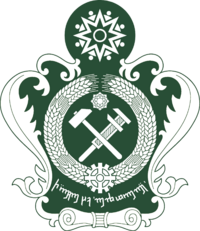Saakalistal: Difference between revisions
No edit summary |
|||
| Line 23: | Line 23: | ||
|religion = 81% Naraism<br/>19% No religion | |religion = 81% Naraism<br/>19% No religion | ||
|government_type = {{wp|Sortition}} Democracy | |government_type = {{wp|Sortition}} Democracy | ||
|leader_title1 = | |leader_title1 = Premier | ||
|leader_name1 = Ķäṡ'ek Na'käri | |leader_name1 = Ķäṡ'ek Na'käri | ||
|leader_title2 = Chancellor | |leader_title2 = Chancellor | ||
| Line 46: | Line 46: | ||
|calling_code = [[+501]] | |calling_code = [[+501]] | ||
|largest_city=Vi'ëra}} | |largest_city=Vi'ëra}} | ||
'''Saakalistal''' [Saakish: Ṡa'aķaliśtäl], officially the '''People's Republic of Saakalistal''' [Saakish: Ṡa'aķaliśtäl Ituķur], is a {{wp|Sortition|sortition}}-based {{wp|Democracy|democratic state}} located in Southern [[Ardentia]] with its neighbours being [[Averius]] to its east, [[Anheldac]] and [[Aquitinia]] to the north across the Magnumare Sea and [[Cenagrad]] to the east. The capital of Saakalistal is [[Țälis]], located in the southern part of the country, the city has a population of around 3.7 million meanwhile the largest city in Saakalistal is [[Vi'ëra]], which is located on the north-western coast of Saakalistal and is sometimes referred to as the nation's second capital due to its immense size, population of 5.1 million and equal if not larger importance compared to [[Țälis]] in governmental affairs. | '''Saakalistal''' [Saakish: Ṡa'aķaliśtäl], officially the '''People's Republic of Saakalistal''' [Saakish: Ṡa'aķaliśtäl Ituķur], is a Premier {{wp|Sortition|sortition}}-based {{wp|Democracy|democratic state}} located in Southern [[Ardentia]] with its neighbours being [[Averius]] to its east, [[Anheldac]] and [[Aquitinia]] to the north across the Magnumare Sea and [[Cenagrad]] to the east. The capital of Saakalistal is [[Țälis]], located in the southern part of the country, the city has a population of around 3.7 million meanwhile the largest city in Saakalistal is [[Vi'ëra]], which is located on the north-western coast of Saakalistal and is sometimes referred to as the nation's second capital due to its immense size, the population of 5.1 million and equal if not larger importance compared to [[Țälis]] in governmental affairs. | ||
| Line 57: | Line 57: | ||
=== Biodiversity === | === Biodiversity === | ||
== Government and politics == | == Government and politics == | ||
The government of Saakalistal consists of the Premier, Chancellor, Ministers and the People's Round. The main legislative body is the People's Round which is made up of 100 people and divided into 4 groups with 25 people each: the Impoverished, Lower Class, Middle Class, Upper Class. These four groups are made up of individuals selected at random via {{wp|Sortition|sortition}} when a council is called and are only in the People's Round for 1 day. | |||
The Premier, Chancellor and Ministers are the only long-lasting officials with Premiers and Chancellors being chosen every 2 years with a 1-year offset. Ministers are chosen every 4 years and are select from a walk of life that best fits their ministry. | |||
=== Administrative divisions === | === Administrative divisions === | ||
=== Military === | === Military === | ||
Revision as of 18:42, 19 May 2024
This article is incomplete because it is pending further input from participants, or it is a work-in-progress by one author. Please comment on this article's talk page to share your input, comments and questions. Note: To contribute to this article, you may need to seek help from the author(s) of this page. |
The People's Republic of Saakalistal "Ṡa'aķaliśtäl Ituķur" | |
|---|---|
| Motto: "Va'kaśtir vix́ härenka um nërin raki, Ṡast ķi'ërassik tärir ki'ro tëķra q́a alķalë!" "Undimmed by cloud or shade of night, Here shone for ever fair and bright!" | |
| Anthem: Winds of Home | |
| Status | Independent state |
| Capital | Țälis |
| Largest city | Vi'ëra |
| Official languages | Saakish |
| Recognised national languages | Saakish |
| Ethnic groups | 91.4% Saakishian 8.6% Other |
| Religion | 81% Naraism 19% No religion |
| Demonym(s) | Saakishan |
| Government | Sortition Democracy |
• Premier | Ķäṡ'ek Na'käri |
• Chancellor | Iṡrëķa Ag-Óțrall |
| Population | |
• Estimate | 71,820,000 |
| GDP (nominal) | estimate |
• Total | $2,896,405,079,400 |
• Per capita | $40,328.67 |
| Gini (2017) | low |
| HDI | high |
| Currency | Ķerel (ĶRL) |
| Date format | dd/mm/yyyy |
| Driving side | right |
| Calling code | +501 |
| ISO 3166 code | SKL |
| Internet TLD | .skl |
Saakalistal [Saakish: Ṡa'aķaliśtäl], officially the People's Republic of Saakalistal [Saakish: Ṡa'aķaliśtäl Ituķur], is a Premier sortition-based democratic state located in Southern Ardentia with its neighbours being Averius to its east, Anheldac and Aquitinia to the north across the Magnumare Sea and Cenagrad to the east. The capital of Saakalistal is Țälis, located in the southern part of the country, the city has a population of around 3.7 million meanwhile the largest city in Saakalistal is Vi'ëra, which is located on the north-western coast of Saakalistal and is sometimes referred to as the nation's second capital due to its immense size, the population of 5.1 million and equal if not larger importance compared to Țälis in governmental affairs.
Etymology
The name Saakalistal comes from the Saakishan name for an ancient city-state that existed along the edge of the Magnumare Sea, the name being a combination of the Saakish word "śtäl", meaning fortress or fortified city, and the ancient Saakish name "Ṡa'aķal" thus the full name meaning "Ṡa'aķal's fortress".
History
Geography
Climate
Biodiversity
Government and politics
The government of Saakalistal consists of the Premier, Chancellor, Ministers and the People's Round. The main legislative body is the People's Round which is made up of 100 people and divided into 4 groups with 25 people each: the Impoverished, Lower Class, Middle Class, Upper Class. These four groups are made up of individuals selected at random via sortition when a council is called and are only in the People's Round for 1 day.
The Premier, Chancellor and Ministers are the only long-lasting officials with Premiers and Chancellors being chosen every 2 years with a 1-year offset. Ministers are chosen every 4 years and are select from a walk of life that best fits their ministry.

